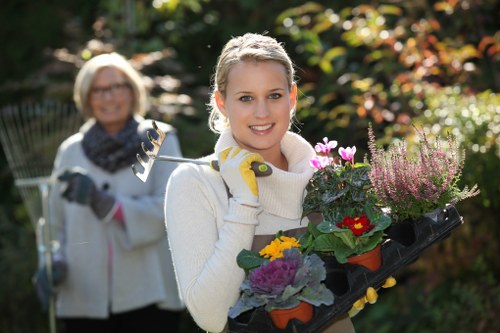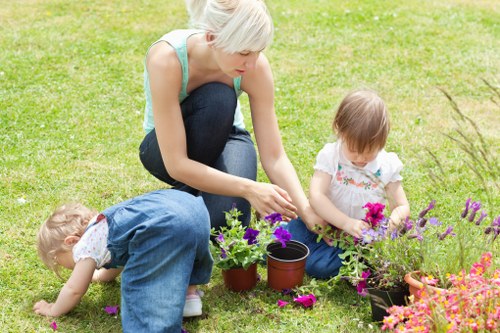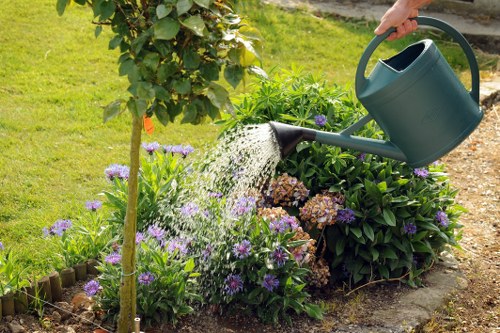Comprehensive Garden Maintenance Services in Euston

Maintaining a beautiful garden in Euston requires a blend of expertise, dedication, and the right tools. Whether you're a seasoned gardener or a beginner, understanding the nuances of garden care can transform your outdoor space into a vibrant and serene haven.
In the heart of London, Euston offers a unique climate and soil composition that influences garden maintenance practices. Local gardeners must adapt their strategies to ensure the health and longevity of their plants, flowers, and overall garden structure.
Proper garden maintenance not only enhances the aesthetic appeal of your property but also contributes to the well-being of the environment. Sustainable practices, such as composting and water conservation, play a crucial role in modern gardening.
Essential Garden Maintenance Tasks

Effective garden maintenance involves a variety of tasks that collectively ensure the vitality and beauty of your garden. Here are some essential activities that every Euston gardener should incorporate into their routine:
- Pruning and Trimming: Regular pruning helps shape plants, encourages healthy growth, and prevents diseases.
- Weeding: Removing unwanted weeds is crucial to reduce competition for nutrients and maintain garden health.
- Soil Care: Testing and amending soil ensures that plants receive the necessary nutrients for optimal growth.
- Mulching: Applying mulch conserves moisture, suppresses weeds, and regulates soil temperature.
- Irrigation Management: Proper watering techniques are vital for plant health, especially during dry spells.
Implementing these tasks systematically can lead to a more organized and thriving garden.
Seasonal Maintenance Tips

Gardens undergo significant changes throughout the year, and seasonal maintenance is essential to address these transformations. Here's how to adapt your gardening practices with the seasons:
- Spring: Focus on planting new flowers, fertilizing the soil, and preparing garden beds for the growing season.
- Summer: Emphasize regular watering, pest control, and harvesting ripe produce.
- Autumn: Conduct fall clean-ups, plant bulbs for spring, and protect plants from colder temperatures.
- Winter: Prune dormant plants, insulate sensitive species, and plan for the upcoming gardening year.
Adapting to seasonal changes ensures that your garden remains resilient and vibrant year-round.
Choosing the Right Plants for Euston Gardens

Selecting plants that thrive in Euston's specific climate is fundamental to successful garden maintenance. Consider the following factors when choosing your garden's flora:
- Climate Compatibility: Opt for plants that are well-suited to Euston's temperate climate.
- Soil Type: Assess your garden's soil composition and choose plants that can thrive in those conditions.
- Sunlight Exposure: Match plants to areas with adequate sunlight, whether full sun, partial shade, or full shade.
- Water Requirements: Ensure that plants selected have compatible watering needs to maintain consistency in irrigation.
- Maintenance Level: Choose plants that align with the time and effort you're willing to invest in their care.
By carefully selecting appropriate plants, you can create a harmonious and low-maintenance garden environment.
Integrated Pest Management

Managing pests is a critical aspect of garden maintenance. An integrated pest management (IPM) approach combines various strategies to minimize pest damage while reducing the reliance on chemical pesticides:
- Biological Control: Introduce natural predators, such as ladybugs and birds, to keep pest populations in check.
- Cultural Practices: Rotate crops and practice companion planting to disrupt pest life cycles.
- Mechanical Methods: Use traps, barriers, and manual removal to control pest populations.
- Chemical Controls: Apply organic or least-toxic pesticides as a last resort, ensuring minimal environmental impact.
Implementing an IPM strategy fosters a balanced ecosystem within your garden, promoting healthy plant growth and sustainability.
Soil Health and Fertilization

Healthy soil is the foundation of a thriving garden. Maintaining soil health involves regular testing, amendment, and proper fertilization practices:
- Soil Testing: Conduct periodic soil tests to determine pH levels, nutrient content, and soil composition.
- Amending Soil: Add organic matter, such as compost or manure, to improve soil structure and fertility.
- Fertilization: Use appropriate fertilizers based on soil test results to provide necessary nutrients for plant growth.
- Mulching: Apply mulch to conserve moisture, regulate soil temperature, and enhance nutrient content.
Consistently monitoring and nurturing your soil ensures that your garden remains productive and resilient.
Watering Techniques for Optimal Plant Health

Efficient watering is crucial for plant health and water conservation. Implement the following techniques to optimize your garden's irrigation:
- Deep Watering: Water plants deeply but infrequently to encourage deep root growth.
- Timing: Water early in the morning or late in the evening to reduce evaporation and maximize absorption.
- Drip Irrigation: Use drip systems to deliver water directly to the plant roots, minimizing waste.
- Rainwater Harvesting: Collect and store rainwater for use in garden irrigation, promoting sustainability.
- Soil Moisture Monitoring: Use moisture sensors to accurately assess when plants need watering.
Adopting these watering strategies ensures that your garden receives adequate hydration while conserving valuable water resources.
Pruning and Trimming Techniques

Pruning and trimming are essential for maintaining plant health, promoting growth, and enhancing the overall appearance of your garden:
- Deadheading: Remove spent flowers to encourage new blooms and prevent disease.
- Shaping: Trim plants to achieve desired shapes and sizes, maintaining a neat and organized garden.
- Thinning: Remove excess branches or stems to improve air circulation and reduce the risk of pest infestations.
- Rejuvenation Pruning: Cut back overgrown or woody plants to stimulate new growth and extend their lifespan.
- Timing: Perform pruning during appropriate seasons to avoid stressing plants and to maximize growth potential.
Mastering pruning and trimming techniques is vital for sustaining a healthy and attractive garden in Euston.
Weed Control Strategies

Weeds compete with your plants for nutrients, water, and sunlight, making effective weed control a top priority in garden maintenance:
- Manual Weeding: Regularly remove weeds by hand to prevent them from establishing and spreading.
- Mulching: Apply a thick layer of mulch to suppress weed growth and retain soil moisture.
- Organic Herbicides: Use natural solutions, such as vinegar or boiling water, to eliminate weeds without harming the environment.
- Cultural Practices: Implement crop rotation and dense planting to reduce weed proliferation.
- Landscape Fabric: Use barriers to prevent weed growth while allowing air and water to reach the soil.
Consistent and proactive weed management ensures that your garden remains healthy and visually appealing.
Implementing Sustainable Practices

Sustainability is increasingly important in garden maintenance. Adopting eco-friendly practices not only benefits the environment but also enhances the resilience of your garden:
- Composting: Recycle kitchen and garden waste to create nutrient-rich compost for soil amendment.
- Rainwater Harvesting: Collect rainwater to reduce reliance on municipal water sources for irrigation.
- Native Plants: Incorporate native species that are well-adapted to the local climate and require less maintenance.
- Pest Management: Favor natural and biological pest control methods over chemical alternatives.
- Energy-Efficient Tools: Use manual or battery-powered gardening tools to minimize energy consumption.
Integrating sustainable practices fosters a healthier ecosystem and ensures the long-term success of your garden.
Garden Design and Layout

A well-thought-out garden design enhances both functionality and beauty. Consider the following elements when planning your garden layout:
- Space Utilization: Maximize the use of available space by incorporating vertical gardening, raised beds, and multi-purpose areas.
- Plant Selection: Choose a diverse range of plants that offer varying textures, colors, and heights for visual interest.
- Pathways and Access: Design clear pathways to facilitate easy navigation and maintenance.
- Water Features: Integrate elements like ponds or fountains to add tranquility and attract wildlife.
- Seating Areas: Create spaces for relaxation and enjoyment of your garden.
A strategic garden design not only enhances aesthetics but also simplifies maintenance tasks.
Efficient Garden Irrigation Systems

Implementing an efficient irrigation system is crucial for maintaining plant health while conserving water. Here are some options suitable for Euston gardens:
- Drip Irrigation: Delivers water directly to the plant roots, minimizing evaporation and runoff.
- Sprinkler Systems: Ideal for covering large areas but may require adjustments to avoid water waste.
- Automated Timers: Schedule watering times to ensure consistent moisture levels without manual intervention.
- Rain Sensors: Integrate sensors to adjust irrigation based on rainfall, promoting water conservation.
- Soaker Hoses: Provide a slow and steady water supply, perfect for garden beds and borders.
Selecting the right irrigation system tailored to your garden's needs ensures efficient water usage and reduces maintenance efforts.
Regular Garden Inspections

Conducting regular inspections helps identify potential issues early, allowing for timely interventions:
- Pest Monitoring: Check plants frequently for signs of pests or diseases.
- Plant Health: Assess the overall condition of plants, looking for discoloration, wilting, or growth abnormalities.
- Soil Moisture: Ensure that soil remains adequately moist without becoming waterlogged.
- Structural Integrity: Inspect garden structures like fences, trellises, and sheds for any needed repairs.
- Tool Maintenance: Keep gardening tools clean and in good condition to ensure effective usage.
Regular inspections facilitate proactive maintenance, ensuring your garden remains in optimal condition throughout the year.
Garden Maintenance Tools and Equipment

Having the right tools is essential for efficient garden maintenance. Invest in quality equipment to make tasks easier and more effective:
- Pruning Shears: For precise cutting of branches and stems.
- Gardening Gloves: Protect your hands from thorns, dirt, and potential irritants.
- Hose and Nozzle: Ensure you have a reliable watering system with adjustable settings.
- Garden Fork: Useful for turning and aerating soil.
- Lawn Mower: Maintain a neat and even lawn with regular mowing.
Maintaining your garden tools in good condition extends their lifespan and enhances their performance.
Hiring Professional Garden Maintenance Services

While DIY garden maintenance is rewarding, hiring professional services in Euston can offer expertise and save time:
- Expertise: Professionals possess in-depth knowledge of local plant species, soil conditions, and climate.
- Time-Saving: Outsourcing maintenance tasks frees up your schedule for other activities.
- Comprehensive Services: From landscaping to pest control, professionals provide a wide range of services tailored to your needs.
- Quality Results: Ensure your garden receives the best care with trained and experienced personnel.
- Cost-Effective: Investing in professional maintenance can prevent costly repairs and plant replacements in the long run.
Consider partnering with a reputable garden maintenance company in Euston to achieve the garden of your dreams effortlessly.
Enhancing Garden Aesthetics

Aesthetic appeal is a significant aspect of garden maintenance. Implement the following tips to enhance the beauty of your garden:
- Color Coordination: Choose plants with complementary colors to create visually appealing schemes.
- Texture Variety: Incorporate plants with different leaf shapes and textures for added depth.
- Seasonal Blooms: Plant species that bloom in various seasons to ensure year-round vibrancy.
- Garden Art: Add sculptures, decorative stones, or water features to introduce focal points.
- Lighting: Use outdoor lighting to highlight key areas and extend the enjoyment of your garden into the evening.
Thoughtful design choices can transform your garden into a stunning and inviting outdoor space.
Maintaining Lawn Health

A healthy lawn contributes significantly to the overall appearance of your garden. Follow these practices to maintain lush and green grass:
- Regular Mowing: Keep your lawn at an optimal height to promote dense growth and reduce weed infiltration.
- Fertilization: Apply appropriate fertilizers to provide essential nutrients for vigorous grass growth.
- Irrigation: Ensure consistent watering to prevent drought stress while avoiding waterlogging.
- Aeration: Periodically aerate the soil to improve air and water penetration to the roots.
- Pest and Disease Control: Monitor and manage common lawn pests and diseases to maintain grass health.
Consistent lawn care practices result in a resilient and attractive turf that's the envy of your neighborhood.
Gardening for Wildlife

Creating a garden that supports local wildlife enhances biodiversity and contributes to a balanced ecosystem:
- Native Plants: Incorporate plants that attract pollinators like bees and butterflies.
- Water Sources: Provide water features to support birds, insects, and other wildlife.
- Shelter: Include shrubs, trees, and ground cover to offer homes for various species.
- Avoid Pesticides: Limit the use of chemical pesticides to protect beneficial insects and animals.
- Compost Piles: Serve as habitats for decomposers and other small creatures.
By fostering a wildlife-friendly garden, you contribute to environmental conservation and enjoy a lively and dynamic outdoor space.
Budget-Friendly Maintenance Tips

Maintaining a garden doesn't have to be expensive. Implement these budget-friendly tips to keep your garden thriving without breaking the bank:
- Reuse and Recycle: Use recycled materials for garden structures and compost organic waste for soil enrichment.
- DIY Projects: Take on do-it-yourself projects for landscape enhancements and tool maintenance.
- Seasonal Sales: Purchase plants and supplies during off-peak seasons to take advantage of discounts.
- Seed Starting: Grow plants from seeds rather than buying expensive seedlings.
- Community Resources: Utilize local gardening clubs and community gardens for shared resources and knowledge.
With creativity and resourcefulness, you can achieve a beautiful garden while staying within your budget.
Final Thoughts on Garden Maintenance in Euston

Garden maintenance in Euston is a rewarding endeavor that combines knowledge, effort, and creativity. By following the outlined practices and staying attuned to your garden's needs, you can cultivate a thriving and beautiful outdoor space.
Whether you choose to manage your garden independently or enlist professional services, prioritizing regular maintenance ensures the long-term health and beauty of your plants and landscape.
Embrace sustainable practices, stay informed about local gardening trends, and enjoy the myriad benefits that come with a well-maintained garden.
Get Started with Your Garden Today

Ready to transform your garden in Euston? Contact us today to book your garden maintenance service and take the first step towards a lush and vibrant outdoor sanctuary.